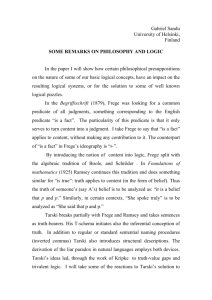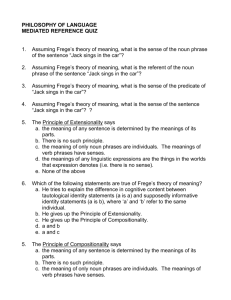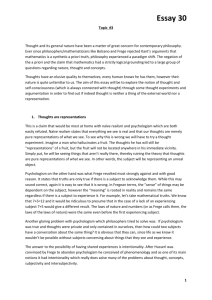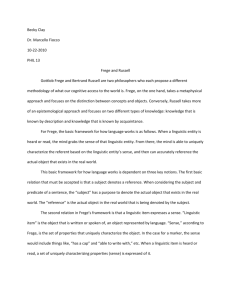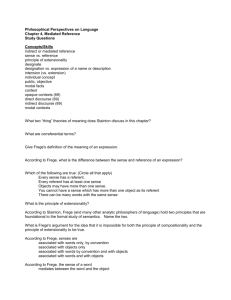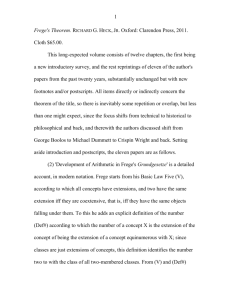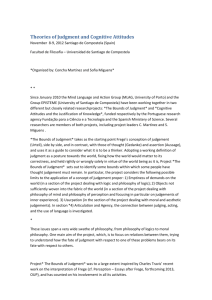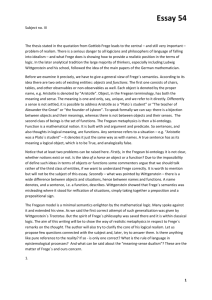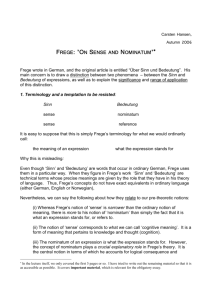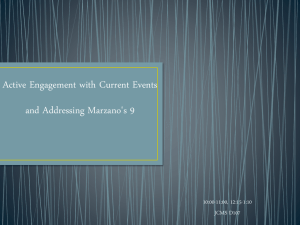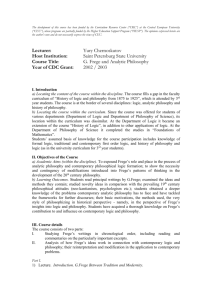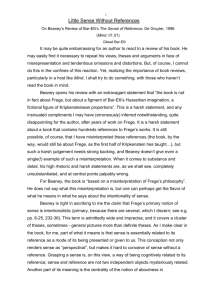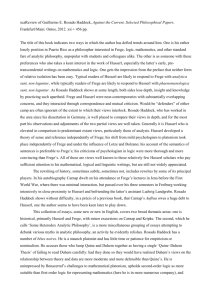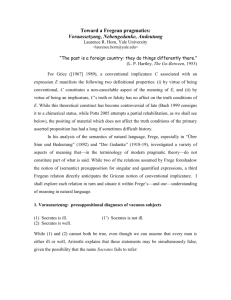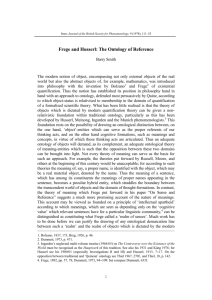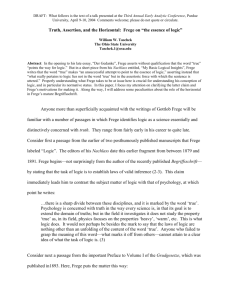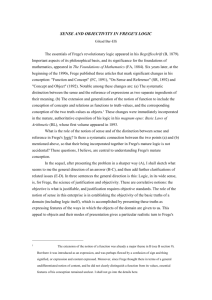Antti Autio (Finland)
advertisement
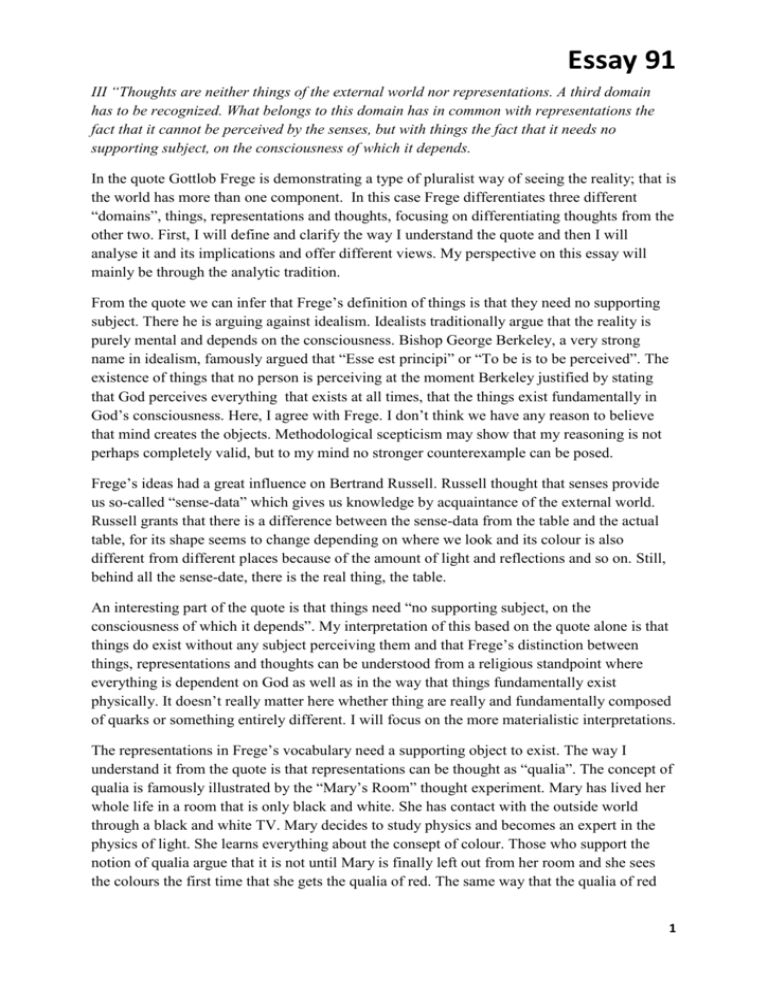
Essay 91 III “Thoughts are neither things of the external world nor representations. A third domain has to be recognized. What belongs to this domain has in common with representations the fact that it cannot be perceived by the senses, but with things the fact that it needs no supporting subject, on the consciousness of which it depends. In the quote Gottlob Frege is demonstrating a type of pluralist way of seeing the reality; that is the world has more than one component. In this case Frege differentiates three different “domains”, things, representations and thoughts, focusing on differentiating thoughts from the other two. First, I will define and clarify the way I understand the quote and then I will analyse it and its implications and offer different views. My perspective on this essay will mainly be through the analytic tradition. From the quote we can infer that Frege’s definition of things is that they need no supporting subject. There he is arguing against idealism. Idealists traditionally argue that the reality is purely mental and depends on the consciousness. Bishop George Berkeley, a very strong name in idealism, famously argued that “Esse est principi” or “To be is to be perceived”. The existence of things that no person is perceiving at the moment Berkeley justified by stating that God perceives everything that exists at all times, that the things exist fundamentally in God’s consciousness. Here, I agree with Frege. I don’t think we have any reason to believe that mind creates the objects. Methodological scepticism may show that my reasoning is not perhaps completely valid, but to my mind no stronger counterexample can be posed. Frege’s ideas had a great influence on Bertrand Russell. Russell thought that senses provide us so-called “sense-data” which gives us knowledge by acquaintance of the external world. Russell grants that there is a difference between the sense-data from the table and the actual table, for its shape seems to change depending on where we look and its colour is also different from different places because of the amount of light and reflections and so on. Still, behind all the sense-date, there is the real thing, the table. An interesting part of the quote is that things need “no supporting subject, on the consciousness of which it depends”. My interpretation of this based on the quote alone is that things do exist without any subject perceiving them and that Frege’s distinction between things, representations and thoughts can be understood from a religious standpoint where everything is dependent on God as well as in the way that things fundamentally exist physically. It doesn’t really matter here whether thing are really and fundamentally composed of quarks or something entirely different. I will focus on the more materialistic interpretations. The representations in Frege’s vocabulary need a supporting object to exist. The way I understand it from the quote is that representations can be thought as “qualia”. The concept of qualia is famously illustrated by the “Mary’s Room” thought experiment. Mary has lived her whole life in a room that is only black and white. She has contact with the outside world through a black and white TV. Mary decides to study physics and becomes an expert in the physics of light. She learns everything about the consept of colour. Those who support the notion of qualia argue that it is not until Mary is finally left out from her room and she sees the colours the first time that she gets the qualia of red. The same way that the qualia of red 1 Essay 91 can exist only within the concepts red, the representations can only exist on a “supporting subject” as Frege put it. Before we really get into the notion of thoughts in the quote we will have a glimpse of Frege’s philosophy of language. Frege thought that there is a difference between the sense and the reference of the word. We can clarify that with an example. Let us consider two following sentences. (1) Tallinn is Tallinn. (2) Tallinn is the capital of Estonia. There is a clear difference between these two sentences. The first one is a tautology whereas the latter can provide new knowledge for a person who doesn’t know that Tallinn is the capital of Estonia. However, according to many representative theories of language, the phrases “Tallinn” and “the capital of Estonia” refer to the same thing and thus there should be no difference between these two sentences. Frege’s insight was that although “Tallinn” and “the capital of Estonia” have the same referent, they have different senses. That way the sentence (2) gives the sense to the word “Tallinn” which can be useful for the person who didn’t know the sense of the word “Tallinn” before. I argue that Frege’s concepts of thoughts stems, at least partly, from his concept of sense. Let us consider another sentence. (3) Atlantis doesn’t exist. For representative theories of language this sentence doesn’t make any sense because it refers to an object that by the definition of the sentence doesn’t exist. Frege argues that the sentence (3) has a sense but not a referent. The sentence can be seen as a thought in the definition of the quote. It cannot be a thing since that would be a contradiction (I take the word “exist” in sentence (3) meaning existing as a thing). Neither can it be representation because it has no supporting subject. Now we have an interpretation of the concepts of the quote. However, the quote is not without its problems. Firstly it has the problem of all pluralistic systems: how can the domains interact with each other? My thoughts are in many ways influenced by my senses and thus by things. But how could that be if they are in two different domains? There seems to be no clear answer of that. Either the domains are fundamentally different, and therefore cannot interact with each other or they are the same. The second problem is the Ockham’s razor. It states that we should not assume the existence of entities that are not needed, in other words we should keep the theories as simple as possible. It can be argued that the world of representations is just the way we see the things and does not exist on its own. Ockham’s razor can be thought being more of a guideline than an actual principal but that still raises the question of what this theory can do that monist theories, materialism for example, cannot. Frege could argue that thoughts, for example, are well outside the senses and thus cannot explained by things alone. 2 Essay 91 We can also use John Locke’s idea of “tabula rasa” here. The empiricist idea that all information we get comes through our senses from the outside world and in fact even the most abstract of concepts are generalized from concrete ones that we have acquainted practically can well be defended. Thus Frege’s assumption that thoughts and things are fundamentally different can be challenged. Frege’s quote seems to have the underlying assumption of thought realism. It supposes that some thoughts are true by virtue of their terms alone. Good candidates for that kind of thoughts are a priori –sentences, such as the classical example “All bachelors are unmarried”. This sentence is also analytic, because the term “bachelor” includes the idea “not married”. Immanuel Kant argued that there is also synthetic (opposed to analytic) a priori –knowledge, such as 3+4=7 because the “seven” is not included in the meanings of “three”, “four” or “addition”. However, the whole concept of a priori knowledge is challenged by W.V.O.Quine. Quine has created the famous notion of “the Web of Belief” which states that the human knowledge is similar to a web. The most basic assumptions, such as 2+2=4 are in the centre of the web whereas our newest scientific theories, for example, are in the borders of the net and can easily be replaced. Still Quine argues that everything, even the most basic facts of the web can be challenged and, if needed, replaced. There would be no a priori –facts, facts that are true by the virtue of their meanings. Quine’s position is supported by the fact that different logical systems, for instance, have been created. In addition to classical logic we can also have logic systems where the Law of Excluded Middle (a thing either exists or its negation exists) does not hold. Logical principles are just conventions acquired by senses as well as any other empirical knowledge. That is against the definition of thoughts in the quote. But we run into problems even if we accept a priori –truths existing. My own position is that of a materialist. I think that matter (and energy) is the only thing that fundamentally exist and that our minds only emerge from our neurobiological systems. Thoughts are not fundamentally different from things. I base my argument for mainly the fact that otherwise it is extremely hard to explain the contact between different kinds of entities, as we discussed earlier. I also believe that the approach of science is so useful (think of moon landings) because it really describes the actual world. (We will not dive further into the worldview of science since it is not in the scope of this essay). With that attitude, I think that Frege goes wrong when he differentiates thoughts from the external world. That is not necessary if we suppose them being fundamentally the same. As far as representations go, I think they can as well be explained be our brain’s actions. Representations are actually our brains interpretation of the sense-data we get. They can also be seen as created by the use of certain descriptive words in a society. They would be only conventions in a certain language game (to quote Wittgenstein). A priori thoughts, which we earlier took to be the reason to count thoughts and things as different can be explained either by conventions from our experience (not really a priori in the strictest sense) or by our brains fundamental structure which is from birth. We cannot differentiate between things and thoughts simply by the claim that thoughts “cannot be perceived by senses”. This position doesn’t of course solve all problems; it leaves many questions of our minds open. I still think that it has the virtue of simplicity that Frege’s approach does not have. Of 3 Essay 91 course, even with materialist assumptions we can acknowledge the difference between things, representations and thoughts and accept many aspects of Frege’s approach but I think we should think of them more as different sides of the same coin. Sometimes the difference between a thought and a thing can be impossible to find by Frege’s “perceived by senses criterion” alone. 4
